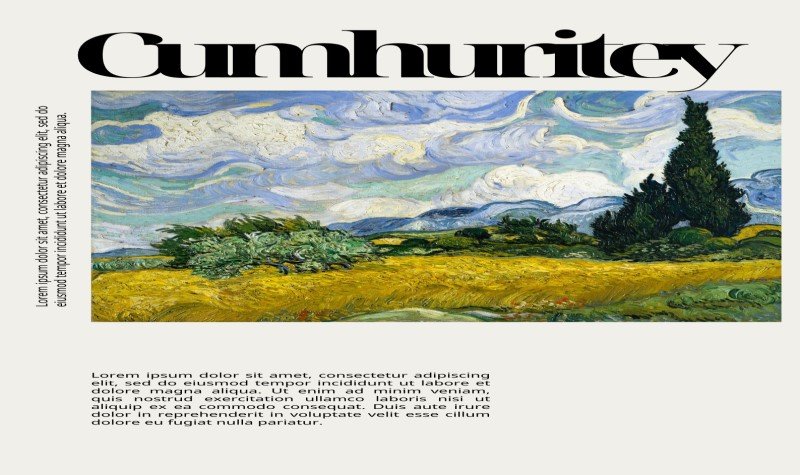Cumhuriyet, a cornerstone of Turkish journalism, stands as a testament to the enduring values of the Turkish Republic. Founded in 1924 by Yunus Nadi Abalıoğlu with the support of Mustafa Kemal Atatürk, Cumhuriyet, meaning “The Republic,” embodies the principles of secularism, democracy, and the rule of law. With a rich history spanning nearly a century, Cumhuriyet has remained steadfast in its commitment to independent journalism despite facing numerous challenges and pressures, particularly from government authorities.
A Historical Institution: Origins and Ideals
Cumhuriyet emerged at a critical juncture in Turkish history, just years after the establishment of the Republic. Its founding principles were deeply rooted in the vision of Atatürk, emphasizing secularism, modernism, and democratic governance. From its inception, the newspaper has served as a vocal advocate for Kemalist ideals, shaping public discourse and championing the values of a progressive society.
Navigating Challenges: Resilience in the Face of Adversity
Cumhuriyet has encountered significant obstacles throughout its history, including government censorship, attacks on its journalists, and attempts to silence dissenting voices. Despite these challenges, Cumhuriyet has persevered, standing as a beacon of press freedom and a symbol of resistance against authoritarianism. Its unwavering dedication to journalistic integrity has earned it national and international acclaim.
A Legacy of Investigative Journalism: Uncovering Truths and Holding Power Accountable
Cumhuriyet’s commitment to investigative journalism has been instrumental in exposing corruption, uncovering scandals, and holding those in power accountable. From the 2014 National Intelligence Organization scandal to the Panama Papers revelations, Cumhuriyet has consistently pursued truth and transparency, earning the trust of its readers and the respect of its peers.
Embracing the Digital Age: Adapting to Evolving Media Landscapes
Cumhuriyet has expanded its reach beyond traditional print media in the digital age, maintaining a significant online presence with millions of monthly visitors. Its engagement with readers through various digital platforms underscores its commitment to fostering open dialogue and promoting democratic values in an ever-changing media landscape.
A Symbol of Secularism and Democracy: Shaping Turkey’s Future
Cumhuriyet’s influence extends far beyond its readership. It symbolizes the enduring values of secularism, democracy, and the rule of law in Turkey. As the country grapples with political uncertainty and challenges to its democratic institutions, Cumhuriyet remains a steadfast advocate for a free and independent press, serving as a bulwark against censorship and authoritarianism.
Conclusion
In conclusion, Cumhuriyet stands as a testament to the power of journalism to uphold democratic values and hold power accountable. Despite facing formidable challenges, Cumhuriyet has remained true to its founding ideals, serving as a voice for the voiceless and a guardian of press freedom in Turkey. As the world evolves, Cumhuriyet’s legacy continues to inspire future generations of journalists and citizens committed to defending democracy and human rights.
FAQs:
1. What is Cumhuriyet?
Cumhuriyet is one of Turkey’s oldest and most prominent daily newspapers. Founded in 1924, it is deeply connected to the principles of the Turkish Republic, including secularism, democracy, and the rule of law.
2. What does the name “Cumhuriyet” mean?
The name “Cumhuriyet” translates to “The Republic” in Turkish, reflecting the newspaper’s alignment with the foundational values of the Turkish state, particularly those championed by Mustafa Kemal Atatürk.
3. What is Cumhuriyet’s political stance?
Cumhuriyet is secular, center-left, and social democratic. It has been a vocal advocate for Kemalist principles, emphasizing secularism and modernism while also adapting to contemporary challenges.
4. What challenges has Cumhuriyet faced?
Cumhuriyet has faced numerous challenges and pressures, particularly from the government. It has been targeted for attacks due to its critical stance against ruling authorities, leading to the imprisonment of journalists and attacks on its offices.
5. What is Cumhuriyet known for?
Cumhuriyet is known for its rich history of investigative journalism, which has revealed significant scandals and issues, such as the 2014 National Intelligence Organization scandal and the Panama Papers. It has also earned international recognition for its commitment to press freedom.
6. How has Cumhuriyet adapted to the digital age?
Cumhuriyet has expanded its reach in the digital age through its significant online presence, engaging with millions of monthly visitors. It has embraced various digital platforms to foster open dialogue and promote democratic values.
7. What is Cumhuriyet’s role in Turkish society?
Cumhuriyet symbolizes the values of a secular, democratic society in Turkey. Despite challenges, it remains a symbol of resistance against censorship and authoritarianism, advocating for a free and independent press.
8. How can I access Cumhuriyet?
Cumhuriyet is available in print and online. You can access its content through its website and various digital platforms. Additionally, print copies are available at newsstands throughout Turkey.
9. Has Cumhuriyet received any awards or recognition?
Cumhuriyet has received international recognition for its commitment to independent journalism and press freedom. Reporters Without Borders awarded it the Freedom of Press Prize and the Alternative Nobel Prize, among other awards.
10. How can I support Cumhuriyet?
You can support Cumhuriyet by subscribing to its print or digital editions, engaging with its content, and advocating for press freedom and freedom of expression in Turkey. Your support helps uphold its mission of independent journalism and defending democratic values.

